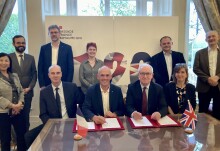

Greater international cooperation is needed to tackle the growing threat of antimicrobial resistance, warned an Imperial researcher.
Professor Alison Holmes, Director of the NIHR Health Protection Research Unit in Healthcare Associated Infection and Antimicrobial Resistance, made the recommendation at the launch of the new Lancet series on antimicrobial resistance (AMR) which took place on Wednesday 18 November at Imperial College London.
We need the international community to come together to take the fight against AMR to the next level.
– Professor Alison Holmes
The series of five papers by world leading experts provides a comprehensive look at how AMR is being tackled worldwide, and how access to effective treatment for infection must be provided and sustained. It also outlines future priorities for researchers and policymakers. Contributing author Professor Holmes said:
“Failure to address AMR will affect everyone, regardless of nationality or their country’s economic position. We need to solve this global health issue from all fronts and this can only be achieved through unprecedented levels of international cooperation. We need the international community to come together to take the fight against AMR to the next level. I hope the event served as a springboard to a stronger and more coherent global response.”

Dr Richard Horton, Editor of The Lancet, welcomed delegates to the launch of the new Lancet series at Imperial
Delegates from pharmaceutical companies and the World Health Organisation, Imperial and other academic institutions gathered at the event to discuss the growing challenge of infectious diseases caused by microbes that have become resistant to existing drugs such as antibiotics.
In some parts of the world, doctors face strains of tuberculosis and gonorrhoea that are essentially untreatable. In the fight against malaria, experts report that there are now just one or two antimalarial drugs that remain effective and in European hospitals including the UK there have been outbreaks of highly resistant bacteria, known as Carbapenem Resistant Enterobacteriaceae (CRE), which is a rapidly growing international threat.
At the event, delegates heard from the series authors that current global efforts to combat AMR are too modest and poorly coordinated. Many high-income countries such as the USA and the UK have developed national plans as well as legislation and regulation to address AMR. However, few middle-income and low-income countries have taken even preliminary steps in this direction.
The series authors recommend the formation of a new UN-level coordinating body for tackling AMR to improve international cooperation, or an international treaty which can mandate implementation of some of the actions which countries will need to adopt to tackle AMR such as infection control policies.
The series authors also suggest that global collaboration is needed in the policy areas of universal access to life-saving antimicrobial medicines and ensuring continued innovation to develop new drugs.
The series authors also outlined that resistance will not be beaten unless a ‘One Health’ approach is adopted globally, recognising that the health of humans, animals and ecosystems are interconnected, and ensuring that any policies to tackle resistance address each of these areas.
During the event, delegates had the opportunity to put their questions to the series authors and a panel of industry representatives including Dr Marc Sprenger, Director of the World Health Organisation (WHO) secretariat for antimicrobial resistance.
Article text (excluding photos or graphics) available under an Attribution-NonCommercial-ShareAlike Creative Commons license.
Photos and graphics subject to third party copyright used with permission or © Imperial College London.
Reporter
Maxine Myers
Communications Division

Contact details
Tel: +44 (0)7561 451 724
Email: maxine.myers@imperial.ac.uk
Show all stories by this author




Leave a comment
Your comment may be published, displaying your name as you provide it, unless you request otherwise. Your contact details will never be published.